#snk meta post
Explore tagged Tumblr posts
Text

Leaving this here.
#attack on titan#levi ackerman#aot#captain levi#levi aot#post war levi#snk levi#levi analysis#aot meta#misinformation#ivorypostdump
325 notes
·
View notes
Text
Something I find fascinating is how Isayama sharply contrasts Levi's cleanliness to the "filth" in the underground, from filth I mean the worst that humanity had to offer, being surrounded with murders and people who commit heinous crimes but Levi being so dedicated to cleanliness could also mean him being as compassionate, selfless and kind he is, in a place where such traits are rare.
How underground is a place of total deprivation not even sunlight reaches there, how easy it is to lose any sort of hope in the world where there is no light but Levi still holds light within by simply being the compassionate man he is and finding great value in life. Levi didn't even have anyone good to look up to (except his mother who died quite early) and the first thing he was taught was violence but how Levi was able to still be a morally upstanding man.
For this simple fact alone, I truly admire and respect Levi, it takes so much strength to be able to do that. Really Levi ackerman is the best character on aot and noone can tell me otherwise.
#levi ackerman the man that you are#aot meta#levi ackerman#levi#attack on titan#aot#snk#shingkei no kyojin#levi aot#levi ackerman aot#levi snk#captain levi#levi appreciation post#i hope it makes sense
247 notes
·
View notes
Note
i do absolutely think Levi having some sort of sexual trauma has been built upon over the years. There’s just so many small things that point to that kind of trauma, and Bad Boy just compounds on those things.
his aversion to sleep has always been very strange to me, he doesn’t even lay down to do so and only ever gets a few hours. it could just be a general unease/feeling a lack of safety but Levi isn’t exactly an outwardly anxious person. im sure his ability to sustain himself on only a few hours of sleep has something to do with his Ackerman power, but he almost seems to have a tendency to avoid laying in beds as a whole. i’m not sure we ever see him in one (perhaps the barracks in No Regrets?) outside of his major injury towards the end.
honestly even though his obsession with cleanliness can be associated with growing up in a dirty environment like the underground (very common IRL w people who grow up in poverty or hoarding etc) something about it always raised an eyebrow to me. feeling somehow “filthy” in a way that is difficult to shake is a very common trauma response for SA victims. He’s also particular with human gore in a way he isn’t with Titan gore. to be fair Titan blood literally steams off, but idk the elaborate get up in the torture scene stick with me, why is a guy who constantly cuts down giant meat monsters full of blood and sinew suiting up with an apron and rubber gloves to punch a human?
When Kenny finds him with Kuchel’s body he’s only wearing of one of her old shirts (if i remember right) which could also be just associated with the neglect he faced as Kuchel’s health declined and she wasn’t able to keep working, but it could absolutely have much worse implications. he’s surely under-clothed for a child that age.
and speaking of Hange i think this is also a huge indicator of how important their friendship w Levi was. i think the “Levi has to knock Hange out to bathe them” lore was mostly a joke, but i absolutely believe that Hange would have a knack for working themselves into exhaustion and neglecting their personal hygiene and the fact that Levi, who is adverse to dirtiness and probably physical touch, would still be willing to help Hange take care of themselves on that level is very important to me.
idk, again there’s just so many small things that compound. i think ppl who refuse to even consider that possibility are ignoring a huge subtext in his writing.
the writing in Bad Boy reminds me a lot of an RPG character from Dragon Age called Zevran, who has a very similar backstory (prostitute mother, grew up in a brothel after she died giving birth) and SA/sex trafficking is a huge part of his writing, it’s never explicitly said but he gets incredibly close to saying it multiple times.
Absolutely, anon, I'm really glad you brought this up. I agree with you. Your observations are thoughtful and deeply grounded in the subtle, but persistent, cues throughout Levi’s characterization. There’s a strong case to be made that Levi’s childhood experiences, especially as hinted in Bad Boy, suggest sexual trauma as part of his backstory, and I agree that this thread has been quietly but consistently built over time across multiple Attack on Titan texts, including the main canon itself, Bad Boy, and the A Choice with No Regrets manga and OVA.
I’ll be honest, though; I sat on this ask for a little while. Not because I disagreed, but because I’ve grown cautious about diving back into this particular conversation, lol. I hope you're still around to read my response! There’s been pushback in the past, and it’s easy to get worn down by the defensiveness and bad-faith interpretations that inevitably come with it. But ultimately, I don’t want fear of fandom backlash to silence a valid reading of the text.
Just to be clear, I’m not saying there’s any explicit confirmation that Levi was sexually abused. What I am saying is that there is a consistent body of subtext—textual, visual, and behavioral—that makes this interpretation both plausible and worth discussing. It’s one lens among many, and it’s one that aligns with real-world trauma responses in a way that deserves thoughtful attention.
For anyone curious and looking to read more on this topic, including some of my older posts and others’ contributions, here are a few links:
To actually address your message and your points, anon:
When Kenny first discovers Levi, the imagery is haunting. Levi appears severely malnourished, neglected, and ghost-like. He’s wearing only a shirt, which not only suggests poverty but also emphasizes how profoundly vulnerable he is. While it’s never confirmed whether the shirt belonged to Kuchel, the idea that it might have is a valid and plausible headcanon. What is confirmed is that Levi is shown curled up on the floor in the same room as her decomposing body, completely alone. In the context of a brothel—where Kuchel worked as a sex worker and where strangers would have regularly entered and exited the space—Levi’s state of undress takes on more disturbing implications. We never learn who had access to that room after Kuchel’s death, nor how long Levi was left to fend for himself there. And as you pointed out, for a child that age to be so underclothed in such a setting is more than just a sign of deprivation—it casts a shadow over the kind of dangers he may have been exposed to during that time.
Now, I’m aware there’s some debate in the fandom about whether Levi and Kuchel actually lived in the brothel where she worked. Personally, I do believe they did. But even if they didn’t, Kuchel’s notoriety as "Olympia"—a well-known prostitute—means that clients familiar with her could very well have come looking. Regardless of the precise location, the threat would have remained the same.
It’s also important to consider how the Attack on Titan universe establishes the Underground as a site of rampant exploitation, especially sexual violence and trafficking. In "Chapter 6: The World that the Girl Saw", we learn that Mikasa, who lived on the surface, was nearly trafficked into sexual slavery. The traffickers planned to sell her specifically to the Underground, where such exploitation was evidently common and profitable. If that was the fate planned for a surface child, it paints a grim picture of what life must have been like for children born in the Underground. Levi wasn’t just born there—he was the son of a sex worker, raised alone in a brothel after her death. In Bad Boy, we see that even as a child, Levi was almost sold into the same system by thugs looking to profit off him. On top of that, he was well-known locally as a “whore’s son,” a stigma that would have marked him as vulnerable. Given this context, and considering how openly the narrative depicts trafficking as a real danger even for children with more protection than Levi had, it’s tragically plausible that Levi endured violations that the text never directly names. Whether or not his trauma is ever confirmed in explicit terms, the setting, circumstances, and behavioral cues all suggest that he was not spared from the kind of exploitation that was normalized in the world he grew up in.
A Choice with No Regrets further deepens this portrait of Levi. As an adult in the Underground, he’s strikingly hyper-independent, emotionally guarded, and instinctively distrustful. His stoicism goes far beyond what would be considered adaptive for someone in a harsh environment—it reads instead as the psychological armor of someone who learned, early and brutally, that vulnerability is dangerous. What’s telling is how this contrasts with Furlan and Isabel, who also grew up in the Underground but retain a more open emotional register. Levi, by contrast, keeps himself closed off—even from those he clearly cares about. Another subtle but telling detail is his relationship to sleep. As you noted, Levi rarely lays down to rest. Even after Return to Shiganshina, when he’s critically injured, we only see him in bed when he’s completely incapacitated. His irregular sleep habits suggest that rest—and the vulnerability it entails—is something he instinctively avoids. It’s also worth noting that Isayama has confirmed in interviews that Levi typically sleeps in a chair. That choice feels significant: what is it about beds, specifically, that feel unsafe to him? It’s a small detail, but one that subtly reinforces the idea that Levi's avoidance of rest is tied not just to environmental danger, but to deeper psychological trauma.
One moment from A Choice with No Regrets that I think is often overlooked—or, worse, completely misread—is the scene in the manga where Levi kills Isabel’s attacker. There’s a strong implication that the man had either raped or was planning to rape her. Isabel returns visibly shaken, and the fact that her hair was forcibly cut—while some try to minimize this—is itself a physical violation. That kind of act doesn’t happen without bodily restraint, humiliation, and intent to dehumanize. Levi’s reaction isn’t casual vengeance or impulsive rage. It’s swift, cold, and deliberate. And it stands out all the more because Levi is consistently portrayed as someone who does not enjoy killing, especially when it comes to other humans. He doesn’t take satisfaction in it, and he’s shown to feel the weight of taking lives. But in this moment, he kills with no hesitation. That’s not just about protecting Isabel; it’s also about what that kind of violation represents to him. This scene adds another layer to the subtext that Levi may have experienced sexual trauma himself. His actions suggest not just outrage on her behalf, but a deep, visceral recognition of what was done to her. When you consider his background—being raised in a brothel, growing up in a community where sexual violence was commonplace, and being personally threatened with it—his response in this scene becomes far more layered. It's not about bloodlust; it's about survival and protection.
As for his obsession with cleanliness, I completely agree that it likely stems from both his impoverished upbringing and something deeper. Like you stated, the trauma of feeling “unclean” in a psychological sense is a known marker in many survivors of sexual abuse. Levi doesn’t just value hygiene—he’s almost compulsive about it. In chapter 15, when he enters Trost HQ, his first instinct is to clean, even in the midst of military chaos. It’s a trait that speaks to more than just surface disgust; it feels ritualistic, like he’s trying to scrub away something intangible. We also know from the Smartpass AU Levi Close-up Report that part of the reason Levi cares so much about cleanliness is because he associates filth with disease. That alone demonstrates that the cleaning is a coping mechanism for something greater.
The A Choice with No Regrets OVA also contributes to this subtext in a subtle but unsettling way. In one sequence, a group of thugs corner Isabel, and after she bites one of them, he implies he wants to assault her—saying, “She’ll pay for bitin’ me. Lemme have some fun with her before we do anything else, ’kay?” Levi isn’t present for that threat, but it establishes that these men are sexual predators and underscores how normalized sexual violence is in the Underground. Shortly afterward, when Levi confronts the same group, one of the thugs touches the collar of Levi’s shirt. Levi immediately recoils and snaps, “Keep your filthy hands off me. I don’t want you smudging my shirt.” His tone is cold and sharp—disproportionately intense for such a minor touch, unless read through the lens of trauma. What’s especially notable is how Furlan quickly intervenes, almost too casually, saying, “Sorry, 'bout that. We're clean freaks here. You prob'ly shouldn't come back, but if ya do, be sure to wash your hands first.” It’s a strangely timed comment, bringing up hygiene in the middle of a tense confrontation, and it reads more like a deflection than comic relief, at least to me. Furlan’s response seems like a practiced redirection, as if he’s accustomed to covering for Levi in moments like this, aware that Levi’s aversion to touch and obsession with cleanliness may stem from something deeper. The way Levi reacts to even an incidental touch, especially from a man he clearly perceives as threatening (and was established as a sexual predator earlier), raises red flags. Within the broader context of the Underground, where exploitation is rampant and children are especially vulnerable, this interaction adds another layer to the growing subtext that Levi’s boundaries around touch aren’t just about personal preference, but about learned survival.
A common counter-argument I’ve seen is that Levi couldn’t have experienced sexual abuse because, in Bad Boy, when the thugs threaten to sell him into sexual slavery, he awakens his Ackerman powers and kills them. But I think this interpretation misreads both the mechanics of his awakening and the emotional weight of that scene. Levi doesn’t react violently when the men first threaten to traffic him. In fact, he stays relatively passive through much of the assault, even as they kick him and beat him down. What ultimately triggers his Ackerman powers isn’t the threat of trafficking alone—it’s a combination of two far more visceral elements: first, the insult to his mother (“whore’s son”), which cuts directly at the only attachment and source of comfort he’s ever known; and second, the imminent threat to his life. When the men begin slamming his head into the ground, it’s not just brutal—it would have been fatal. That moment of near-death, combined with emotional provocation, is what pushes him to awaken. This is consistent with how Ackerman power is described elsewhere in canon: it’s often activated in a life-or-death situation.
Importantly, most sexual trauma, especially in childhood, is not marked by that same level of immediate physical lethality. It’s often coercive or normalized within the environment, particularly when it occurs repeatedly over time. If Levi had experienced prior instances of sexual trauma, there’s no reason to assume his powers would have activated. The context simply wouldn’t have matched the threshold required. What Bad Boy shows us, in fact, is how long Levi endures violence without fighting back. His gentle, quiet demeanor in that scene says a lot; he’s not someone who reacts with aggression instinctively. He internalizes pain. He withdraws. And that, in itself, is a trauma response. The idea that Levi could only have been victimized if he had physically fought back or "activated" sooner misunderstands both trauma and how the Ackerman lineage functions in canon.
And yes, the way Levi interacts with Hange is one of the clearest examples of how touch and boundaries operate differently for him with people he trusts. The oft-joked “Levi knocking Hange out to bathe them” anecdote, while humorous in fandom circles, does imply a certain level of trust and care on his part that cuts directly against his usual physical avoidance and aversion to filth. If you believe Levi is touch-averse because of trauma, then the fact that he’ll tend to someone else’s body—grime, sweat, and all—speaks volumes. It reflects a profound emotional bond.
Btw, I've never played Dragon Age, but I agree that the situation with Zevran sounds similar to the situation with Levi. Isayama never explicitly states that Levi was sexually abused—but neither does he shy away from leaving the space open.
The resistance from some parts of the fandom to even consider this reading is telling. It reveals discomfort not just with the possibility of Levi being a victim, but with the idea that masculinity and vulnerability can coexist. For some, Levi must remain a stoic archetype of masculinity, not someone whose past might include being violated or exploited. But the reality is that Attack on Titan is saturated with trauma, and Levi’s trauma is one of the most underexplored and underacknowledged parts of the narrative, precisely because it’s so coded in subtext.
In short, the subtext is there. The behavioral patterns are consistent. And your instinct to read between the lines is absolutely justified. Bad Boy doesn’t explicitly confirm that Levi was sexually abused, but it significantly strengthens the already persistent implication. Acknowledging that possibility isn’t reaching—it’s a valid interpretation of the character and the narrative choices surrounding him.
Thanks for the ask, anon! I hope my answer was interesting to read.
#attack on titan#levi ackerman#shingeki no kyojin#shingeki no kyoujin#aot#snk#aot meta#snk meta#levi#captain levi#aot levi#levi aot#aot.meta#meta.levi#c: levi ackerman#my thoughts#it's kind of sad I felt the need to add so many disclaimers to this post lol#but I'm very wary after all the fandom discourse on this subject in the past#asks#anon asks
87 notes
·
View notes
Text
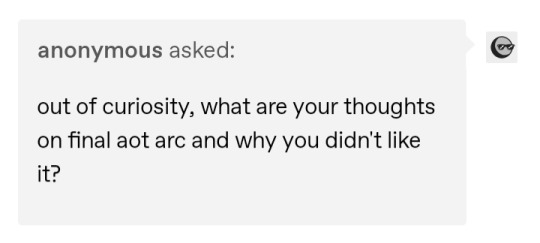
Thank you for killing me slowly by a thousand mental cuts the ask, anon! First of all, lemme apologize for taking so long to answer, but in my defence, you asked me quite the question here.
I want to say first that I used to be a big snk fan. And then the final chapter was released. It was so bad that it made me look at the whole series with a very critical eye, which made me realize that snk has never been that great to begin with. What really made this story good was the anime produced by WIT, and what really carried the story was its big mystery box. The moment we opened it, everything went downhill bc this was no longer a fantasy world, but a lazy parody of ww2 Germany & Japan.
But more importantly, and referring to the final arc, I started to notice all the rot hidden in plain sight: its fascist and antisemitic undertones, the awful writing, the lackluster worldbuilding, the braindead politics and the inconsistent treatment of characters.
Despite my newfound interest for the cautionary symbolism of Reiner and his character arc, I still think it was handled poorly. I have the same problem with characters like Gabi, Annie, Magath, and Pieck. Their individual arcs ended with them facing no real consequences for their crimes. Magath, despite being a literal representation of the nazi, was rewarded by the plot with a heroic death (a baffling choice when you think about who he is and what he did, and just how brutal and meaningless all of the Scouts deaths were pre timeskip). Reiner, Annie, Pieck, and Gabi were all rewarded with the promise of a new, happier life ahead of them, despite being responsible for hundreds of thousands of deaths directly or indirectly.
Gabi herself is proof of just how bad the writing is: RBA lived inside the walls for around 3 years, and yet they still went on with their mission. They still killed Marco. Annie still massacred those Scouts. It took Reiner 7 years to fully acknowledge that what he did was wrong and to finally make amends ... by joining an alliance that had the same goal as that of the warriors for the whole goddamn arc: take down Eren. However, Gabi realized she was wrong in like what, just a few months at best? Their development is dictated by however the plot needs them to be or act. But there's more:
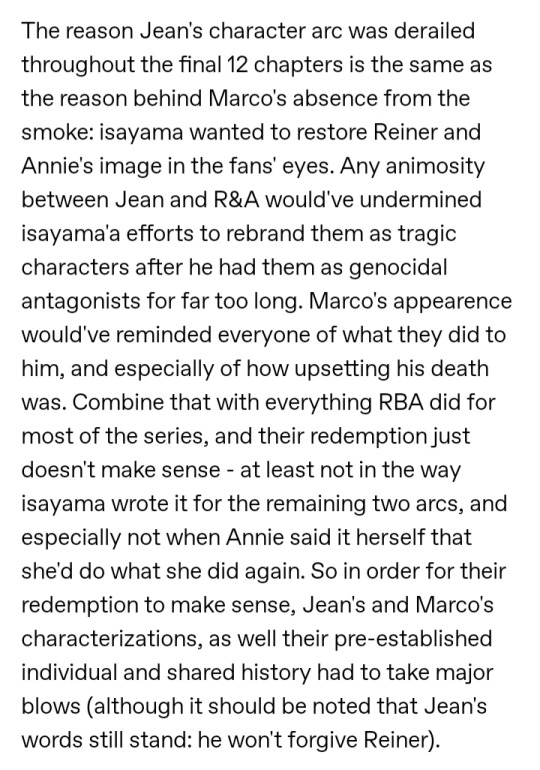
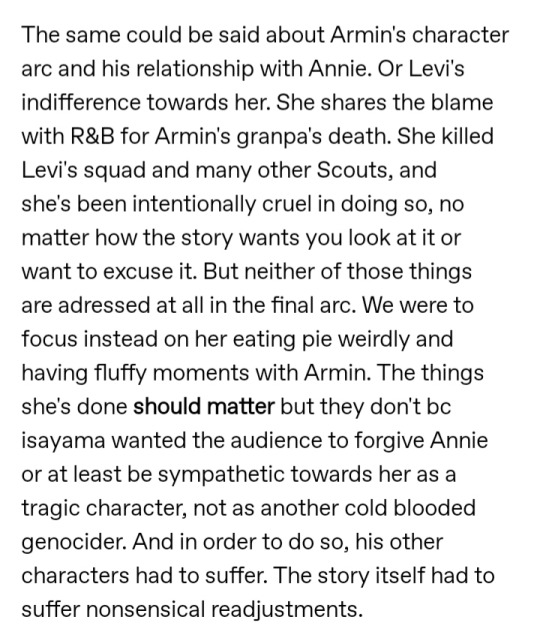
Marco, the Levi Squad, Sasha, and -- as victims of similar circumstances -- Pixis, and Hange, the embodiment of pacifism, were all condemned for being good people, and some of them for believing that there is good in everybody, even in their enemies; and punished for believing that conflicts could be solved in peaceful ways. Does the cautionary symbolism of their brutal deaths still holds up when the story rewards violence and crushes pacifism?
I don't think it does.
Showing that even the worst of the worst are capable of change and doing the right thing in the end is an important message, but. The idea that everyone is just a victim of their uprising or their circumstances is simply wrong. Ideologies don't exist without people, cowardice does not justify orders carried out that lead to attrocities. This idea fails to acknowledge that evil exists. Not just nuanced evil, but pure evil as well. It also goes the other way around. This idea also fails to acknowledge that good can exist.
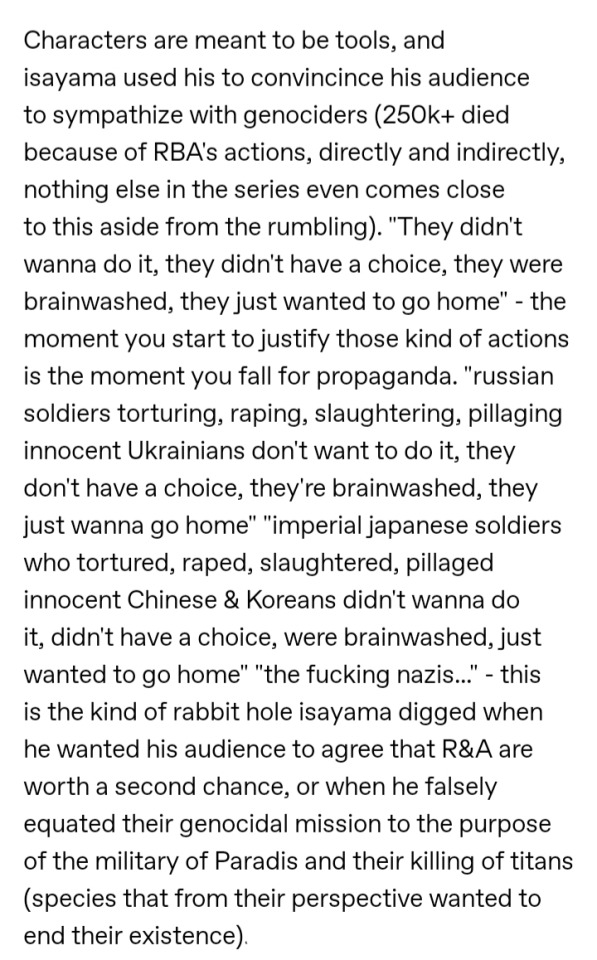
And also to sympathize with Pieck, who was still loyal to marley despite what they're doing to her own people. And Magath, who in his final moments, revealed that he actually cared about the kids he was indoctrinating and instructing to commit genocide all along. I can't ignore the similarity with the way neonazi like to bring up hitler's friendship with Bernile Nienau, a girl of Jewish origins, as an attempt to humanize him. Heck, even Zeke's final moments painted him as more sympathetic than he was. Such is the case with Floch, and the way Jean reacted to his death. All those characters were redeemed in the audience's eyes without facing any substantial accountability.
I also have a huge issue with the false equivalences that were supposed to show us how morally grey everyone and everything is.
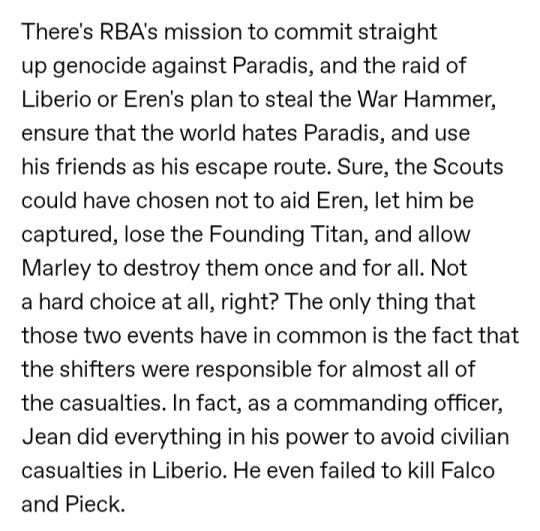
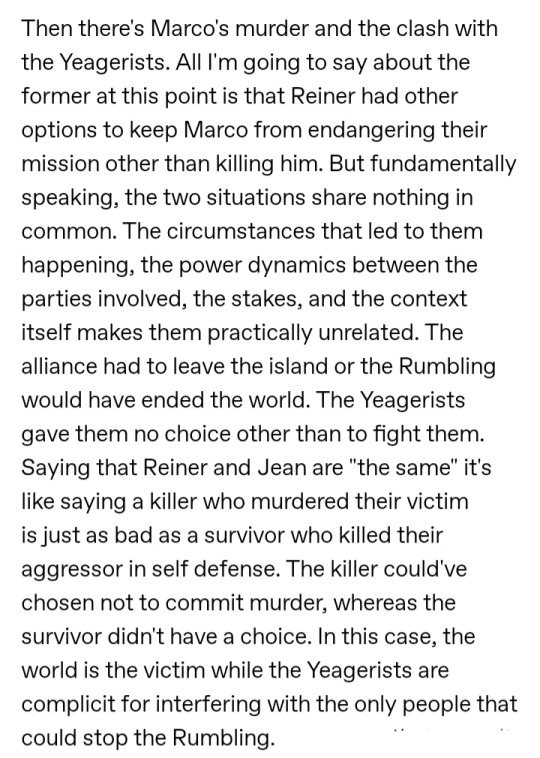
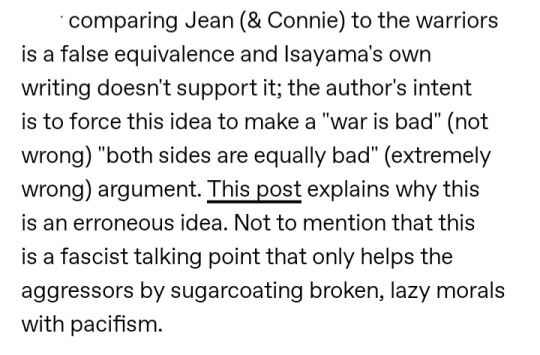
-> The link to the post in the screenshot
Jean and Connie and the Scouts that attacked Liberio aren't just wrongfully presented as something they're not, they're also used as tools to rationalize what Reiner and co have done to them throughout most of the series. Jean briefly does that with what Reiner did to Marco before he punches him to a pulp. Then again with the "we're the same" bs. Then again with implying Reiner is one of them as a Scout. There's also no real tension between the warriors and the Paradis side of the alliance. What the warriors did to Paradis is truly horrific, so their only way for redemption is through their victims.
The mistake that most people do when they interpret their relationship or the characters themselves is to only look at the characters' in-story intent. But there's also this thing called the author's intent that overrides everything. Sometimes, you cannot separate an author from their work. Especially when it comes to the final 12 chapters, where the quality of the writing is in the sewer.
But there's actually another way through which these characters were redeemed: the introduction of a much greater evil and a much horrific event that makes everything else pale in comparison. The main conflict of the story was revealed to have always been Eldians vs Eldians. But that wasn't always the case. Not until isayama retconned Eren, and then treated him the same way he treated the warriors. Eren's friends refused to condemn his actions, and instead repeatedly rationalized, then absolved and thanked him for what he did. It doesn't matter that they still did what was right in the end, that Mikasa killed him, or that Armin admitted they're both going to hell for the atrocities they've individually committed. In the anime. Which came out almost 3 years after the release of chapter 139+the extras and the massive backlash that followed. Let's not forget how that conversation went in the manga:
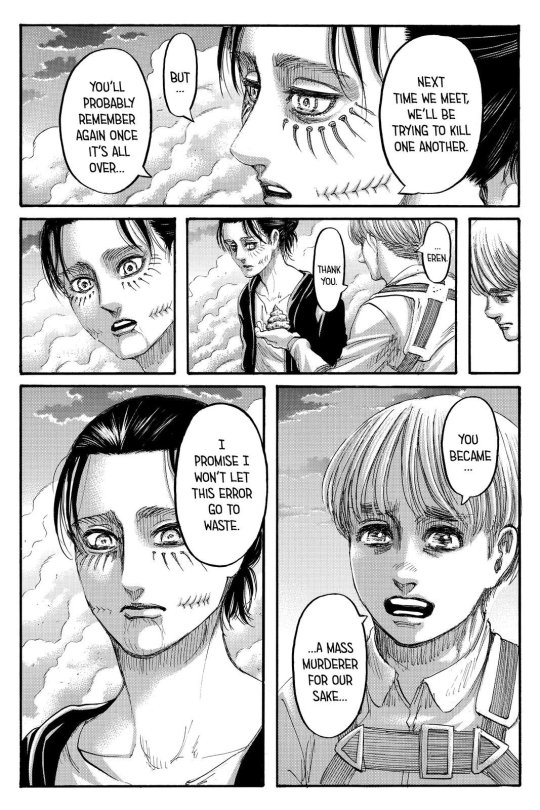
None of that matters because there's a dissonance between their actions & words and their attitude. isayama couldn't condemn any of his genocidal characters in a way that matters, in a way that would leave no room for moral ambiguity. But perhaps the greatest injustice isayama has committed to his own characters, story and messages was to retcon Eren, the character that was at the center of a message as powerful as the idea that we're all special because we're simply born in this world, into a genocidal maniac that cared about no one and nothing (if he actually cared about his friends, he wouldn't have put them through living hell, not when he actually had the power to prevent it, and if he actually cared about his mother, he wouldn't have killed her) through one of the worst executions of the time travel trope I've ever seen.
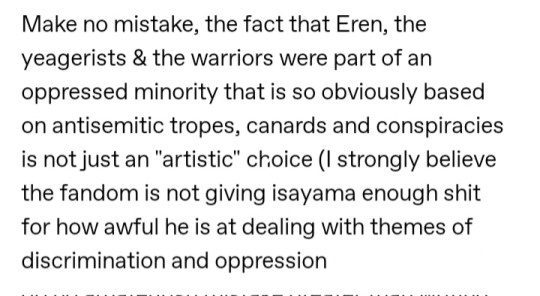
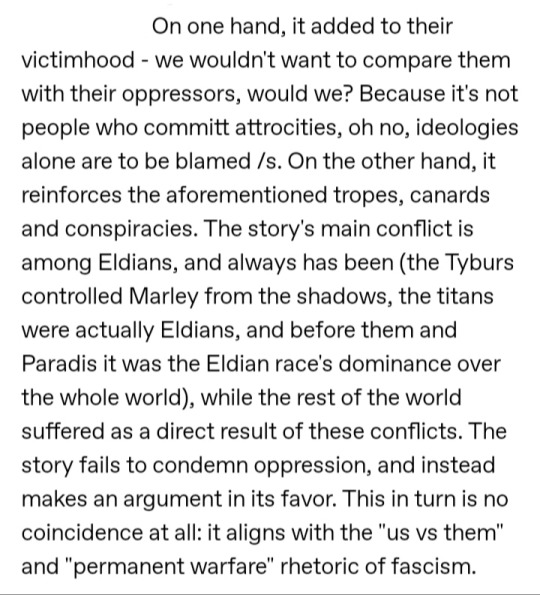
Snk is not a story that condemns fascism, let a lone a "masterpiece" when it comes to social or political themes, because it's centralized on justifying the oppression of the Eldians and making it an integral part of the plot. Not only are the Eldians an obvious metaphor for Jews, which is antisemitic on its own given how it's executed, but isayama ends up making them truly horrific because he takes real world antisemitic conspiracies and turns them into factual realities in his own story, all while seemingly acknowledging that Jews have been oppressed and the victims of the worst genocide in history. Moreover, the Eldians also seem to be ideologically inspired by imperial Japan, Paradis in particular. As @ shangyang points out in their essay, we shouldn't forget the fact that this is a manga authored by a Japanese man, nor that Japan has its own history with fascism. (Plesse don't skip any of the posts linked here)
All that being said, isayama's true intent is more than clear: violence is praised because his characters were written so to see violence as their only option, and the fascist mentality of eternal warfare as the status quo. Pacifism is not presented as an option. There's no nuance, only extremism. Even the cycle of hatred at the very end only serves as proof that the intent of the story is to present an extremely narrow worldview in which the human species is only capable of perpetual warmongering, hatred, destruction, and death. Which is wrong and is the very opposite of what I'd call "nuance", imo. And the reason this bothers me so much is because snk and other "morally grey" works alike aren't portraying evil people as just that, people, and evil as something that exists in all of us - no, what they're doing is making the unlikeable likeable, the unjustifiable justifiable, and they're making people sympathetic towards things they shouldn't be sympathizing. Such narratives are banalizing evil (if I had a nickel for how many posts I've seen justifying what Magath did or outright saying they love the guy, well I'd have a lot of nickels) and depreciating good (lots of nickels for all the posts I've seen bashing the Scouts). Such narratives serve as propaganda for the things they claim to condemn.
The result is that such stories beget ignorance, and ignorance is a fertile ground, whether is the case of people who are only interested in shipping and blorbofication, or the people who are not properly educated to know what they're dealing with.
And there's a reason actual fascists and neonazi are circling the series like flies, identifying with the yeagerists, and saying that "Eren was right". They're not taking control of the narrative, they're seeing it for what it really is. The progression of Eren's character arc, his motivations, the retcons, the conclusion of the story, Ymir's motivation, the undeserved redemptions, the characters not behaving in ways they should based on their history, none of those things make sense because they don't have to make sense. They're only pretexts meant to mask the actual intent of the story. The cycle of hatred didn't end because the rumbling truly failed. Because "the enemy" (the people outside Paradis, all of them, as Eren made it very clear) wasn't completely obliterated. Because as long as there's "the enemy", there can't be peace. Fascists have a complex relationship with war. They don’t like it, but "the enemy" is always forcing their hand. The rumbling was meant to succeed.
This is not a cautionary tale for anti-fascists.
Snk is a cautionary tale for fascists.
Now recontextualize all of that in present-day fascist politics, and see where it takes you. But ofc, this is only my interpretation, based exclusively on the story itself.
#i finally finished this thing#there are likely other issues i forgot to talk about but it doesnt matter cause this post is already too long#what matters is that im freeeeeeeeee#aot#snk#anti isayama#anti aot#attack on titan#shingeki no kyojin#aot meta#tw antisemitism#anti warriors#pro scouts
58 notes
·
View notes
Text
aot post-canon character dynamic that i'm suddenly interested in: armin and reiner
armin generally puts aside his own feelings--or more like doesn't consider them in the first place--and is pleasant and kind to people, right
now remember that scene where there was a delay in preparing the flying boat. armin's immediate suggestion was for him to stay behind to delay the colossal titans (and die), said in a 'this is unfortunate but it only makes sense, nothing that can be done 😔' way. jean was like wtf no, you're our best chance to both stop eren or reason with him, this is a horrible plan. then reiner immediately volunteered to stay behind, but with a much more obviously ..sad, self-hating demeanor.
i think this way that reiner tends to be very obvious about what armin's also feeling but not expressing (and would probably find pathetic to express) would annoy armin. despite his best efforts not to be annoyed lol. and it could be messy and interesting, they would get closer in the end + armin would have to confront his attitude towards himself a bit
63 notes
·
View notes
Text
ok just one more thing about color analysis
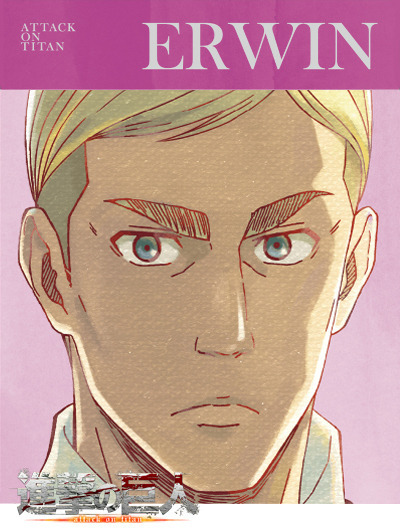
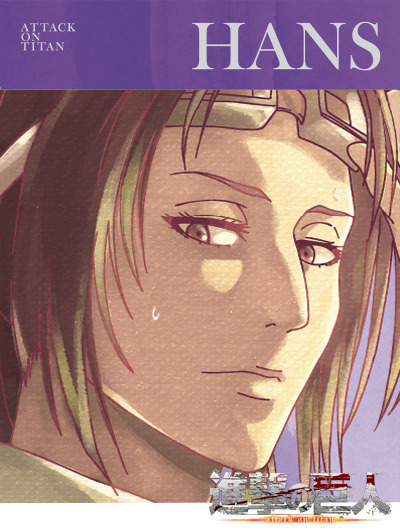
(here is the my full post about the color analysis on other characters including Hange)
This one is specifically about Erwin. What I like about his "official" color is that it's the same as Hange's - purple, mirroring their similar fate of becoming Scouts leader. But there's difference in hue, Hange's looks balanced due to having equal ratio of red and blue whereas Erwin's is magenta and warm-toned due to addition of red. And this addition of red is where the root lies.
Beyond the shared qualities that Erwin and Hange possess and that the color purple symbolizes, such as knowledge, ingenuity, dreams and energy - the very attributes that propelled both into great commanders - the additional touch of red in Erwin's color introduces another layer of connotation to his personality, complementing the classic purple symbolism.
Red symbolizes many things but ones that are relevant to my rant are as follows:
The first and obvious one is bloodshed (cuz blood is also red believe it or not). This connotation ties in with Erwin's treatment of his soldiers and subordinates. Although he cares about them, he doesn't hesitate to sacrifice them for the sake of the mission's success which would often result in lives being lost and blood being spilt.
Going off the blood association, the color red also invokes danger - the feeling that was very evident in each of Erwin's endeavors as his plans would entail endangering the lives of other soldiers.
On the positive note, one of connotations of this color that also pertains to Erwin is passion and driving force. In Erwin's case it mirrors his dream to see what lies beyond the walls, the thing that dictated Erwin's decision.
Another thing worth mentioning is that red is commonly known as the color of revolution - a pretty low hanging fruit for me to point out, considering that Erwin went and did just that in season 3.
All in all, the added hint of red to Erwin's "official" color only underscores the aspects that distinguish him from Hange's approach to leadership. On one hand it's more bloodier and cruel when it comes to soldiers' lives but on the other hand it is more driven and inspiring (not that Hange's isn't it's just their dream doesn't really require an army of soldiers, their dream is more "scientific")
#and this concludes my first and last post about erwin cuz i dont feel qualified enough to talk about him beyond the realm of color symbolism#also erwins been given other colors like blue and gray but shhhh were talking purple only#aot#attack on titan#aot meta#snk#shingeki no kyojin#snk meta#erwin#erwin smith#hange#hange zoe
70 notes
·
View notes
Text
Just watched the last episode of AoT, and man it's wild that I started reading the manga and watching the show when I started high school and now it's finished as I graduate college
Anyways, here are my shower thoughts:
Attack on Titan is a tragedy. Obviously. Eren is young, foolish, and emotional, as many tragedy protags tend to be, ala Hamlet.
But what I think a lot of people take issue with is that a lot of people tend to view the story thru a shounen lens of the main character is the good guy and is always fighting for what's right, and once he wins, everything will turn out great - which is ahem not aot in the slightest
And I think that's how you get all those people showing their support for one side or the other, especially with the jeagerists. Cuz Eren's the main character and ofc he's in the right, he's the mc!
But that's not what a tragedy is about. It's not about the epic fights or about defeating a single opponent and then everything turning out dandy. It's about the consequences of your actions, no matter your intentions, and the cycle of anger and violence that keeps ever turning. And Aot is a really well written tragedy in my opinion! It really spells across how hopeless you are in the face of war and violence and how this violence can create people who believe they're doing right but are actually just causing more death and destruction (really my mind is just going crazy with the Hamlet/Eren parallels here). Eren is 19, angry, traumatized, and trapped by all this crazy future and past knowledge that can't be good for his psyche obviously. He's not the same as a shounen protag, you can't expect him to be in the right, and for everything to turn out okay after what he's done, basically. Tragedies end in tragedy unfortunately
Anyways tldr: Aot is a tragedy and Eren is a literal 19yo who was not gonna make the right decisions and that's the point - and not enough people view it this way. I haven't seen people's reactions to the anime finale yet but I feel like quite a few people might not like the ending, or who knows maybe I'll be pleasantly surprised
#viridi posts 2023#attack on titan#aot spoilers#attack on titan spoilers#snk#aot#aot anime finale#aot anime#aot meta#my thoughts#viridi speaks
101 notes
·
View notes
Note
Since we're giving Armin parent trauma...
HC that he's not used to small acts of affection. Mate gets a headpat and bluescreens.
Source?
We, we know that Eren and Mikasa care for him. He knows that Eren and Mikasa care for him. But those have always been big acts of affection. Eren pulling him out of the titan. Mikasa kicking the blade out of his hand that one time and then threatening to kill Levi. Scene he was unconscious for. Eren hugging him post Titanification.
Thing is, those are big things. I love mikasa but I'll be honest, up until the taking of Shiganshina, i was not sure she cared about Armin as much as she tolerated him bcs he was Eren's other soulmate.
( Armin and Mikasa would not pass an Eren based Bechtel test, but that's a rant for a diff time if anyone's interested)
My point is, Armin is not used to outward expressions of affection. If we are to add the " parents were more preoccupied with travelling than him" and the " you were the better choice to Erwin from a logical side", i feel like it could be interesting if Armin had a hard time accepting that people like him as a person.
So yeah, this is my rant/hc that Armin would be completely unprepared for casual affection and that Connie, Jean and Sasha would take advantage of that
( Annie too post canon. She leans into his ear and sais something sweet and Armin blushes worse than if she'd suggested exhibitionism)
Heeeelllo!
I agree y'know? I feel the same way. As you said, Armin knows Eren and Mikasa love him; it's not like he's oblivious to it.
His problem is that it's hard for him to take in this love and really absorb it because he doesn't see anything in himself worth loving. The things you've mentioned, i.e., his parents leaving him behind, the survivor's guilt + the pressure of living up to Erwin and failing - all meet here at this common point. He knows people love him, he knows they care and he knows it's not just because he can be useful in some ways. But as much as he can feel the love and even be comforted by it for a few moments, it's very hard to sustain that feeling over long periods of time.
I believe what will benefit Armin the most is to know that he's wanted.
Not 'needed', because the military needs him (a working brain + able bodied soldier), Mikasa needs him (to get through to Eren sometimes), Eren needs him (someone to talk to), the 104th needs him (because "sometimes" he comes up with good plans right?), but does anyone truly want him? Just for being him and nothing more?
Cuz if his parents didn't want him (a question he might have as he grows up), then who will? He was their only son after all.
So, back to what you say, any act of affection that drives home the point that Armin's simply wanted by the people around him is bound to affect him to the moon and back. He'll blush and stammer and not know what to do because it's an overwhelming surge of feelings he's not sure he deserves but they're there anyway, arresting his heartbeat.
This can be extremely wonderful to see during his cadet years if Jean, Sasha and Connie sling their arms over his shoulders and take him shopping because "We want to go shopping with you Armin!" or Marco and Reiner save him some special kind of bread in the mess hall during a morning he's running late for breakfast since, "We know you like this bread, Armin."
That aside, my personal favourite thing is to see him receiving this kind of love post rumbling because he's so broken and damaged at this point of time having committed more heinous crimes, and therefore being told and shown that he's wanted, so very very wanted, no matter how silly or serious or even sexual, over and over again across years, will really heal him.
Thank you for sharing your thoughts with me, this made me very happy :3
#i want armin to be kissed and cuddled to hell and back#halfway through this i dove into Armin's state of mind and psyche in too much detail so i had to delete that#if anyone wants i can get into it but it'll have to be a post of its own#anyway!#ask#midnightlighthowlite#armin arlert#shingeki no kyojin#attack on titan#character analysis#meta#aot#snk#arminarlert
27 notes
·
View notes
Text
eruri & finding peace
of the things i remember recently gaining insight into with eruri, its that they're fundamental reflections of each other, and through this their relationship enabled a resolving of their internal quandaries.
its pretty well known that they're mirror characters (hence their synchronicity), with purpose also informing both their narratives, but they were able to access the truth of their purpose within each other. — erwin was confronted with duty vs drive and the pairs' fight for prominence within him, whereas levi was confronted with self-objectification vs fallibility.
levi idealized erwin as a wholly dedicated person with no personalized conflicts of interest. he saw him as elevated, uninhibited, humanity's paramount heart — a beacon — and was thusly able to dedicate his life in turn, doubly forgiving the loss of his fallen friends in the service of the greater good and the ability to be unflinchingly active in one's pursuits and efforts (i.e dedication/purpose).
erwin, on the other hand neglected a part of his authenticity: both in his ambitions and his responsibilities to humanity. he assumed a relentless resolve which strained the juvenile, personal nature of his wants, and denied him from openly espousing his perspective and ambitions with others, seeking validation/satisfaction through success and output. but, as vindication loomed, he was unable to suppress his truth, with his allegiance to duty distressing him given selfishness opposing his all or nothing/dedication mindset.
levi, while disillusioned, also received a sobering look at his encapsulation of humanity's finest, coming to realize that his romanticization and consequent emulation/endeavoring towards self-objectification was unrealistic, and neglects the fundamental impurities and selfishness which make us human. levi is able to accept erwin in his jejune wants, and places value over his autonomy / rest over service and being a mere tool.
levi has always been one with humanity since his recruitment, with his prioritizing of eren's autonomy wrt turning [early in the show] acting as a key example, however, this is furthered in him humanizing humanity's beacon, displaying an overt and pivotal evolution to his aspirations.
erwin, conversely, is emboldened in the sanctity of his duty. in relinquishing his true humanity/vulnerability to levi and enabling him to be purposeful for the both of them, trusting levi fully in a way reminiscent of the latter's own former idealization, erwin finds true purpose. and so, when levi commands him to make the selfless choice, erwin can die fulfilled, can die with a heart dedicated, having truly ascended above fallibility and into an apex of human will.
thusly, when levi desperately clings to his need for erwin, one now pure and wholly accepting [obfuscating it through utility], it is erwin who emulates levi and allows himself to wholly embrace peace, satisfied truly, and granted purpose even in his rest. and it is levi who relinquishes the toil for the decided heart of another, able to make peace with humanity once more, releasing erwin from the clutches of duty and allowing personhood/self to endure. both united by unfettered humanity.
a man consumed by duty dies at the will of hands and not the machine, and a man consumed by the machine makes an ultimate sacrifice in service of another, and both are granted purpose through fulfilling the other.
#eruri#aot meta#idk#shingeki no kyojin#aot#levi attack on titan#levi aot#aot eruri#snk erwin#erwin x levi#erwin smith#aot erwin#commander erwin#snk#levi ackerman#original post
24 notes
·
View notes
Note
Hello Lost I hope you are having a good day. Do you think Levi actually hated Erwin post-ACWNR? I read a lot of post-ACWNR fics because I'm obsessed with the first steps of Eruri but most of them make me feel like I didn't quite understand the manga. To me, it always looked like Levi didn't personally hate Erwin, he was pissed off at everything that made his and his friends' lives a living hell. Those nobles put them down there and were keeping them down there and then used one of their friends to blackmail them into doing his dirty work. Which, by the way, interestingly never mentioned in post-ACWNR fics and always written in a way he was doing it for himself or he just hated Erwin but his hatred for Erwin comes from the fact that to him, Erwin was just another person from above that came down to use him and his friends, they were just tools to Erwin at that moment so he was mostly pissed off at not even being seen as people? Everyone was using poor underground people as their pawns. But after Isabel and Furlan died, it sounded like Levi was blaming himself more than blaming Erwin and that's why Erwin's "it was the titans not you" speech hit him so hard? I'm pretty sure Levi still didn't like Erwin so much post-ACWNR but I don't see him actually wanting to kill him or hating him passionately and I was wondering what do you think about this and which post-ACWNR fic is your favorite?
Anonymous asked:
In a lot of fics Levi is depicted as taking an attitude against Erwin after acwnr, as if he still has a grudge against him. In the fandom this is a real interpretation some people have of the canon story as well. I don't understand why, this clearly doesn't sit well with Levi's character. Once he said that he would follow him that was it. I think they seek for him to have some sort of character development as his decision to follow Erwin was all so sudden but what they do to him is character regression, not development.
I don’t know if these asks are both from the same person, or if there was some discourse about ACWNR recently that I missed. Either way, I hope you don’t mind me answering them together. I’m going to answer these on the basis of the manga and the visual novel because I think we can all agree that the anime goes to shit at this point.
We don’t actually get much insight into Levi’s thought process after Erwin’s impassioned “IT WAS THE TITANS” speech in the manga. After Erwin implores him to fight for the Survey Corps Levi’s only response is “I’m not making a deal with you this time…” We learn a lot more from the visual novel about what Levi is thinking. This is the famous “what a man” internal dialogue and never let it be said that I would miss a chance to quote it in full.
“What a man—Levi thought to himself. When he'd gotten caught in the underground, he'd felt humiliated. He had thought that Erwin was brimming with an air of superiority as he looked down at his catch—but now, Levi knew that he'd been mistaken. That kind of quarrel about superiority or inferiority had never concerned Erwin even in the slightest. He was, after all, fighting a more important war against the titans—no, perhaps, it was against something even bigger than that. Fixing his sight on that something, he'd carried on fighting, trying his hardest to defeat it. Levi thought—he'd been obsessed only with his pride, limiting his horizons only to that, and had then lost important friends as a result—with his current self, he definitely had no chance at winning against this man. If that's the case—"All right… It looks like you have something that I lack. Until I know what that 'something' is, I'll go with you."
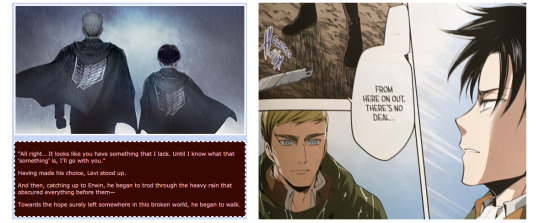
In both cases I’d say that Levi cautiously agrees to follow Erwin but his decision is conditional. He knows that Erwin is fighting for a greater purpose, and he knows that Erwin has something he lacks, so he provisionally agrees to follow him until he finds out what that is. Added to which he doesn’t really have many other options left open to him, so as I see it, his decision to follow Erwin is cautious at best.
It’s clear that Levi does still feel enormous guilt over his friends’ deaths, despite Erwin’s speech that it was the Titans fault, not his own. I think Erwin’s words did get through to him, but you can’t switch off such intense feelings just like that. I can easily believe he continued to experience guilt and grief long after he joined the Survey Corps. People who are hurting and grieving often lash out at those who are closest to them, and in this case Levi doesn’t really have anyone else left other than Erwin, so it wouldn't be surprising if Erwin bore the brunt of his grief. Personally I have a real soft spot for fics that explore Levi’s grief and how he came to terms with his loss as his relationship with Erwin developed.
We know from chapter 20 of the manga that Levi had an antagonistic attitude to authority but that he recognises Erwin’s rank and command. However we don’t know if he placidly submitted to Erwin’s authority immediately after joining the Survey Corps, or if he gradually or grudgingly came to accept it. I tend to think it would have been a gradual process at best, with many missteps along the way.
All this is to say that I don’t think it’s unrealistic for Levi’s relationship with Erwin post ACWNR to be complex, antagonistic and intense. It may even veer into hatred at times, reflecting Levi’s own guilt and grief, but it also grows into unconditional trust and respect. This complexity is why I never tire of reading post-ACWNR fics; every author has their own unique take on how Levi and Erwin’s relationship evolved. If you put me up against a wall and forced me to choose a favourite it would be Black Dog by @stereobone, but there are many more that I love too, which you can find on a rec list here: post-ACWNR fics.
28 notes
·
View notes
Text
I don’t think y’all know how much I live for angst 😂 like, my whole aot main fic - and oneshot snippets to the main story- was all inspired by a song from Sondheim and I love it so much. It’s essentially they’re the right people for each other, just at the wrong time, which is why it moves into a Levi x oc eventually, who is also right person but right time as well.
And then it’s also essentially is Lozen becomes the person others need her to be (a “monster”), and it lands her in a load of shit and forces her to face the terrible choices she made and builds herself back up and is more wise for it, all while she watches Erwin start down the same path, essentially doing the same thing, and refuses to listen to her warnings, so she’s forced to watch with Levi and the others while Erwin runs himself into the ground while trying to convince himself he’s a horrible conman so his conscience can rest easy (because it is hard to follow your dream, do what’s right and send people to their deaths, knowing that there’s a bit of truth behind the selfish wish but also knowing that you care deeply and that’s hard to hold both, so the black and white thinking is easier).
Y’all I have so many feelings about this whole fic and need to gush about it with someone
#paws speaks#fic: odam#odam meta#aot fanfiction#snk fanfiction#Erwin x oc#levi x oc#I shamelessly copied my post in one of the discord groups I’m in because I can’t stop thinking about it
1 note
·
View note
Text
One Timeline, One Fate: How Eren’s Will Shaped the 80% Rumbling in Attack on Titan
Okay, so I’ve seen tons of confusion surrounding the nature of “time travel” in Attack on Titan: Why couldn’t Eren just change the future once he saw it? Are there multiple timelines at play? And if so, did Eren ever really have a choice, or was he locked into carrying out the Rumbling? I decided to make a comprehensive post to help clear things up.
“Time travel” in Attack on Titan is actually more about memory transmission than literal hopping between timelines. Basically, I’ll be explaining the Attack Titan’s ability to see future inheritors’ memories, the Founding Titan’s role in uniting all Subjects of Ymir through the Paths, and how these powers combine to form what looks like a loop of inevitability. By the end, you’ll see why Eren couldn’t—or rather, wouldn’t—alter the course he’d foreseen, and why there’s really only one timeline holding it all together. In essence, Eren chose the future he saw, even if he couldn't alter it.
How does “time travel” work in Attack on Titan?
Attack on Titan does not portray multiple realities or divergent timelines. Rather, the story unfolds along a single timeline, wherein past, present, and future events can influence one another through Titan memories.
In Attack on Titan, “time travel” is really a byproduct of two intertwined abilities:
The Founding Titan’s power (Ymir Fritz’s power):
Connects all Subjects of Ymir through the Paths.
Can alter memories, bodies, and even pass mental images across time if the Founder is involved.
The Attack Titan’s power:
Possesses the ability to view the memories of its future inheritors (not just past ones).
This means the Attack Titan can see glimpses of events that haven’t happened yet—at least to the Titan’s current holder.
When Eren acquires both the Attack Titan and gains partial (and later full) access to the Founding Titan’s abilities (through contact with royal blood, notably via Zeke, and earlier interactions with Historia and Dina), these powers merge, enabling memories to move both forward and backward along a single, unbroken timeline.
How Memories “Move” Through Time
Because of these powers:
Eren can send memories from his future self to past inheritors of the Attack Titan.
These transmissions are selective; Eren chooses which memories to send and to whom.
The Founding Titan’s power effectively creates a network (the Paths) that spans all time. It’s not traditional time-travel ; it’s more akin to a single timeline threaded through everyone connected by Ymir’s bloodline.
It is important to note: The future that is transmitted back is the future that will occur; there are no alternate versions of reality. Once Eren perceives a future or sends a memory of it, the timeline has effectively “locked in” that eventuality.
Key Evidence from the Manga:
The Attack Titan’s Power (Chapter 89)
Eren Kruger demonstrates knowledge of Mikasa and Armin long before they are born, a clear example of glimpsing future inheritors’ memories.
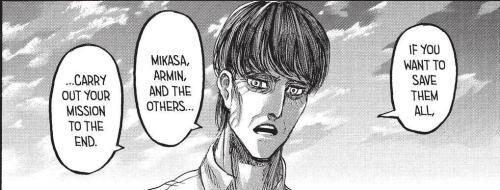
Founding Titan & the Paths (Chapters 120–122)
These chapters illustrate how the Founding Titan’s influence spans all Subjects of Ymir within the Coordinate, enabling far-reaching manipulations of time, memory, and physical forms.
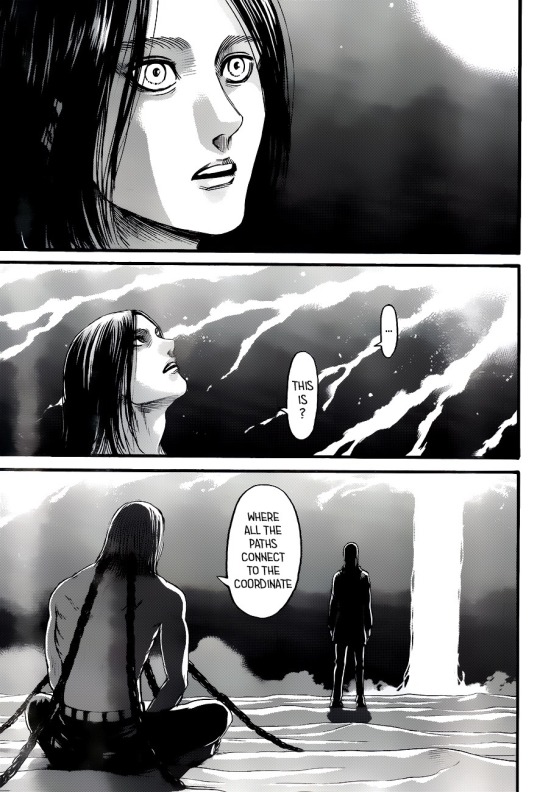
Influencing the Past (Chapter 121)
Eren effectively spurs Grisha Yeager to carry out the attack on the Reiss family. This provides a direct example of Eren influencing the past. Grisha also explicitly reacts to something Eren is showing him—memories from Eren's future, beamed back through the Paths.

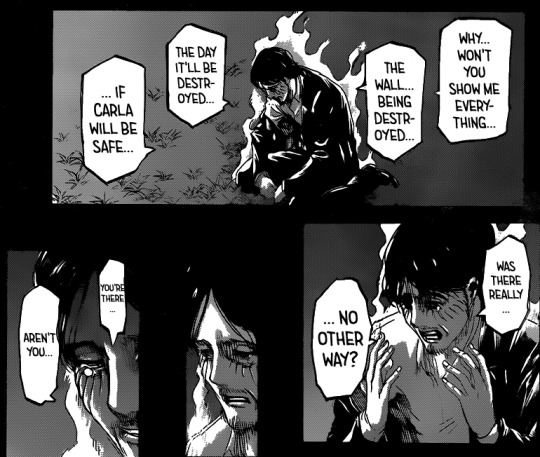
Why Eren Couldn’t (or Wouldn’t) Change the Future
A central question arises: if Eren perceives destructive events on the horizon, why not prevent them? The best way to understand this is recognizing that Eren’s will, his personal desires, and the single, closed loop timeline all lock him into a self-fulfilling prophecy. The Attack Titan does not expose random potential scenarios; it reveals a future shaped by Eren’s own resolve and desires. Once Eren observes (and transmits) a specific future, that future becomes embedded in the timeline. Attempting to deviate would negate the very memories he sent back. Moreover, Eren doesn’t want to negate the memories he sent back. Eren transmits those memories precisely because he wants his past self to strive toward that future. The image of the Rumbling’s destruction (think of the “this is freedom” panel) is what Eren wants to see.
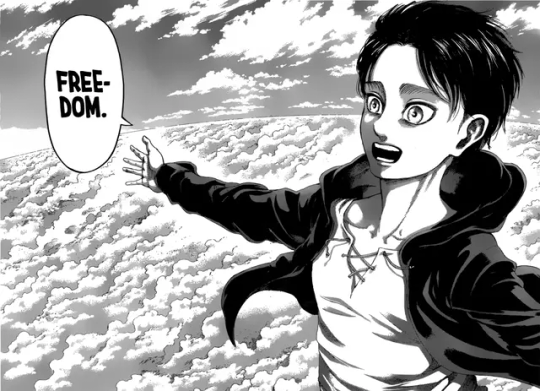
Crucially, he shows this willingness and longing by diverting the path of Dina’s titan away from Bertolt—a decision that ensures certain events unfold exactly as needed (including the death of his own mother) to see a future where he carries out the Rumbling.
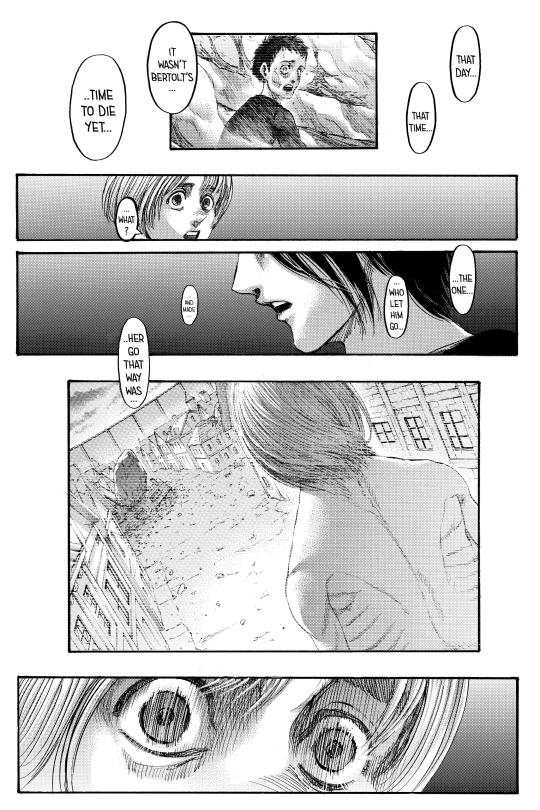
When Did Eren Know He’d Be Stopped at 80% Destruction?
Eren’s early glimpses of the future, derived solely from the Attack Titan, were incomplete. As a result, he initially believed the Rumbling would annihilate the entire world. Not until physical contact with Ymir Fritz in the Paths (Chapters 120–122) did he acquire comprehensive knowledge of the ultimate outcome—namely, that the destruction would halt at roughly 80%, not 100%. Before this full disclosure, his partial insights led him to anticipate total obliteration.
What’s the evidence for this?:
Up until Chapter 120, Eren never had full control of the Founding Titan. It was only when he and Zeke converged in the Paths that Eren finally reached Ymir directly. Until that point, he had only seen glimpses of the future via the Attack Titan’s ability—the most notable example being when he made contact with Historia in Chapter 90.
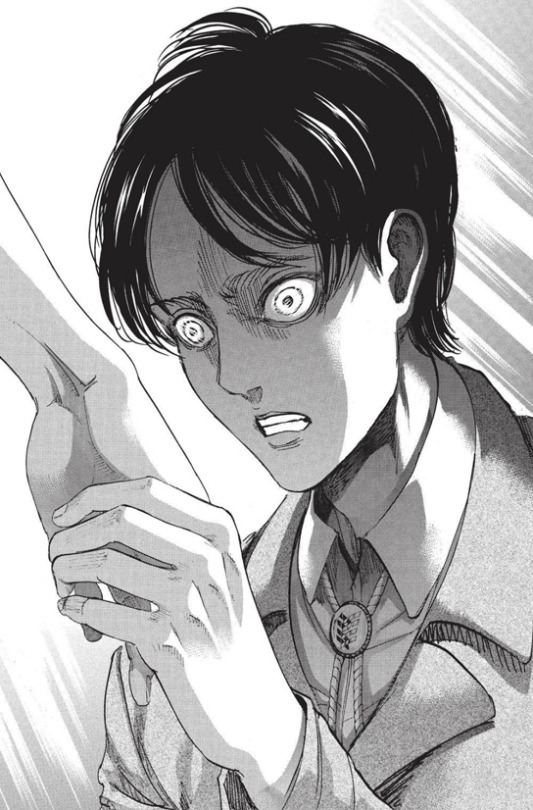
The glimpses of the future Eren sent to himself in the past only showed him the future he wanted to see. As a result, Eren fixated on the outcome he’d been driving toward (total destruction) without realizing there was a point in which he’d be forced to stop. The glimpses he saw led him to think that total annihilation was the endgame; he never saw (or understood) the moment in which the Alliance would intervene and halt the Rumbling. Eren’s mindset pre-contact with Ymir is also important to understand. In the flashbacks with Floch shown in Chapters 130-131, Eren shows no intention of leaving survivors outside the island.
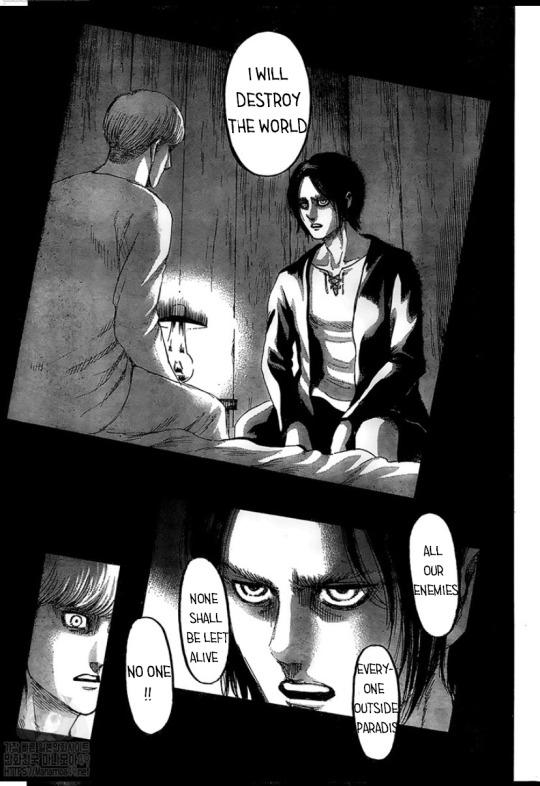
Throughout Chapters 130-131, Eren is also shown deliberating the atrocity he’s about to commit. He fully believes it will erase civilization beyond Paradis.
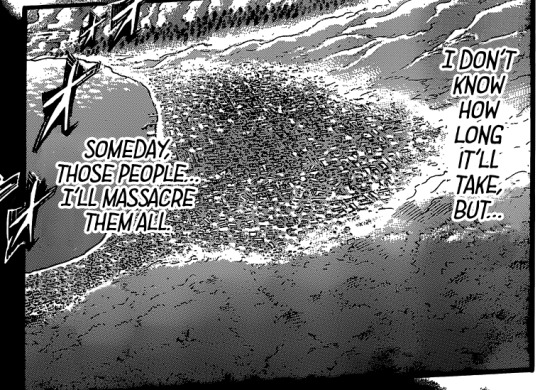
Why didn’t Eren pivot when he learned that 100% annihilation wasn’t in the cards?:
Bringing all of the points together—there’s only one chain of events. The moment Eren sees how it concludes, it’s set—because that’s the future he himself instigates. Even though Eren’s rational mind grasps that the Rumbling will “fail” to achieve total destruction, he’s already committed to forging that horrific reality. This drive, tied to his longing for absolute freedom and a human-free landscape, renders him incapable (or unwilling) to step back. In Chapter 122, Ymir’s choice to grant Eren the full Founding Titan power ensures the unstoppable path forward. The Rumbling commences, and the single timeline proceeds as “destined.” Chapter 139 finalizes the point: Eren outright confesses to Armin that he moved forward with the Rumbling partly because he couldn’t stop himself. His dream of freedom—the same dream that made him wage war on the entire world—also chained him to the future he saw.
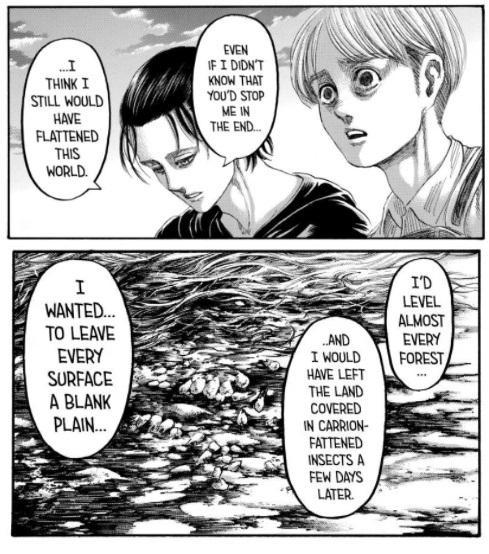
Conclusion
Ultimately, Attack on Titan’s depiction of “time travel” is less about traversing alternate timelines and more about transmitting memories within a single, closed timeline. The Attack Titan sees future events (shaped by the wielder’s own will), and the Founding Titan’s Paths allow those events to anchor themselves in the past. This cycle forms an unbreakable loop, ensuring that the fate Eren glimpses is the fate he brings to life—no matter how horrifying.
So, while it might look like Eren is helpless in the face of destiny, the truth is more bittersweet: he’s trapped by his own desires and the single timeline’s rules. He chooses to walk the path he’s shown, effectively binding himself to the 80% Rumbling outcome. In this way, Eren Yeager’s tragedy lies not in having no choice—but in having a singular, unwavering conviction that makes him want the future he sees, ensuring it can’t unfold any other way.
If you're interested in more of my thoughts on the subject of Eren and whether he had a choice, here's another post I wrote on the topic:
#eren yeager#eren jaeger#attack on titan#shingeki no kyoujin#shingeki no kyojin#aot#snk#attack on titan meta#aot meta#snk meta#aot eren#aot.meta#meta.eren#c: eren yeager#my thoughts#goodness this post took me FOREVER to write lol
95 notes
·
View notes
Text
Breaking down AoT's ending and Mikasa's role in it.
AoT's ending couldn't have been more perfect imo. A story about cycle of violence and abuse that starts with two traumatized children.

The series itself with Eren and the history of their world with Ymir.


A scared, lonely child who experienced violence and cruelty plenty but happiness and love she only witnesses as an outsider, so she develops an illusion of it in her head. She didn't know life outside of servitude, for her Fritz choosing her as his favoured slave meant love and that she earned by her obedience. So she stays obeying his command for 2000 years.

Until Mikasa shows her, that you can love and still make the right choice, that you can love and let them go, that love isn't slavery and she no longer has to obey Fritz because she is a FREE person not a slave. Mikasa's ability to make this choice and be a person independent of her immense love for Eren is what inspires Ymir to do the same and since the past, present and future all occured at the same time her choice to let Fritz die meant her daughters never ate her spine and so the titan power was never passed down to anymore humans.


Eren and Ymir both appearing as children in paths symbolising how Eren was still the scared, angry child who lost his mother to the titans and Ymir still the traumatized girl who never healed and knew nothing but to obey

until she learns to be free from Mikasa.

and finally find peace.
Mikasa was able to end the 2000yr old titan curse and free them both from the long loop of nightmare that they were stuck in because while Eren longed for freedom Mikasa was the one who was truly free from the beginning. She too suffered since her childhood, lost her family twice, lost her best friend and still saved her murderer because she never let her emotions rule her. She has always been able to detach herself and make the right choice.

Mikasa Ackerman represents freedom.
#shingeki no kyojin#aot meta#attack on titan#mikasa ackerman#mikasa aot#mikasa snk#eren yaeger aot#eren x mikasa#eren yeager#attack on titan season 4#eren aot#mikasa#eremika#hajime isayama#ymir fritz#attack on titan eren#posts#mine my own
36 notes
·
View notes
Text
what's Yelena's deal?
i mean her purpose in the story. i see that she wanted to see Eren as special, which could undo development he had in s3, but Eren didn't buy into her idea of him so i don't see the point. was it to just make us believe that he regressed in this way and that's the reason for his actions?
wait no it was pretty visible that he didn't really connect with Yelena, was it to show that he's still disillusioned by the idea of being special. she reminds me of Mikasa in this sense, or more accurately i feel she'd remind Eren of her - on both sides there's someone who believes he's special and unquestionable, and he knows that they're not actually seeing him since he doesn't deserve it (becoming less true for Mikasa at this point, but Eren's not really privy to that). also Yelena wants him to be both special and basically a god, and he is going to take role of a god for a bit, even as a very flawed person.
this doesn't satisfy me as an answer at all btw
there's of course also the point that aot sprinkles in all kinds of characters with different viewpoints formed in reaction to the world they live in to just show them to us, and in that sense i am pretty satisfied with Yelena as a character. it is pretty interesting that she wants to have this religious reverence seemingly for the sake of it. she probably also went against Marley not because of any real moral opposition to them but because she wanted to have a cause, like Pieck implied. ohhhh wait that's like Eren. also never satisfied with life but she did live in a time where she's not in any existential threat so she manufactured a conflict to participate in. ofc it could be that she actually does have a reason to dislike Marley, and it would explain why her conflict of choice isn't to fight for Marley. wait but i kinda like the idea that she was really into saving the world by defeating the island devils and preventing the rumbling or whatever the fuck, but then she saw Zeke
#ofc in general eren sees yelena and mikasa differently i'm just comparing them in this sense#also you could add zeke as someone who sees eren as special to him but it's different. eren's rejection of that has a different vibe to me#now i'm so curious what yelena's upbringing was like#yelena aot#yelena snk#aot#aot meta#snk meta#attack on titan#eren jaeger#eren yeager#snk#my posts
13 notes
·
View notes
Note
Hey, Kit. 👋 Here for the simple shipping ask game with #6, #13, and... #12, but platonic. Who you think they would be good friends with.
hi Stars! thanks for the ask 😊
6. brotp?
if you're not being exclusionary with the term, all of my snk ships, since they're all based on deep canon friendships!
then vitya & chris and phichit & yuuri from yoi that i just can't see as anything else, yosano and every man in the world since my girl is clearly the lesbianest of babes... and i think that's it, aside from all of the obvious platonic-only pairs (any snk veteran with any 104th kid, for ex)
12. ship your mutuals with a character
as you didn't specify which mutuals and i have a few, i'm only gonna platonically ship you with... Armin! you're very sweet but discreet about it (you know what i mean) which would no doubt resonate with him; and thorough in the meta you post/fics you write which shows how interested and invested you are in the things you love. i think Armin would vibe with that, and he would either infodump on you or listen to you infodump on him with joy!
13. do you prefer "toxic" ships or healthy, loving ships?
i wish i could tell you healthy and loving ships, but considering most of my faves have a history of ruining each other's lives just for the hell of it, whether upon meeting each other or repeatedly along the course of their relationship.... ig toxic it is? 🤭
#simple shipping asks#mutuals#mutuals asks#starshower1215#yes 13 is about huddy. and soukoku. and levihan upon meeting and shoot and swan queen and just I HAVE A TYPE OKAY I ADMIT IT
7 notes
·
View notes
Text
i dislike anyone who likes romantic depictions of hansi with men, non-reclaiming feminine depictions of them, or anyone who is otherwise included in the below criticism. do not interact with me without understanding that.
snk contains fundamentally problematic premises, themes and messages. isayama is a citizen of a country that committed terrible war crimes and culturally is not much better today, which is reflected in his own ideals and morals as depicted through his storytelling as well as in corroborative statements made by him about japanese imperialism. i recognize that he is not much more ignorant than the average racial majority in any imperialist country or beneficiary thereof, but i personally believe in individual responsibility and the possibility for a better world which will only be formed through accountability. with that said, it should be clear that i disagree with almost every message of the narrative. i am just here because i am in love with hansi.
on use of my translations: repost is fine as long as you do not edit or claim as your own, especially not to misgender or misspell hansi's name. would prefer to be credited in case someone has a question, but without is also fine.
cause it keeps coming up: i dislike levi and eruri fan centeredness and believe it is inseparable from the reason why hansi was killed. please do not tag me in levi or eruri centric metas, especially not to use hansi as a comparison to their relationship. eruri is subtextually canon, and i believe isayama had a responsibility to address it explicitly the same way he had a responsibility to address hansi's gender identity, but far too often is hansi ignored, sidelined, and regarded as less important by fans, and belittled and discredited by one of the men in the pairing. misogyny and transphobia are not negated by gay identity. i will always defend it, but too little do i see the same extended to femininity and genderqueerness. if levi being nonstraight is canon to you based on author commentary, hansi being genderqueer must also non-negotiably be so. i do not feel prejudice against any eruri fan nor do i dislike the pairing, but if you feel targeted by criticism of cispatriarchy then this blog is probably not for you.
-isayama has requested hansi's english pronouns be they/them ("avoid gendered pronouns") or "at least" he and she with equal frequency. using single gender for them is misgendering them (which kodansha usa and many other "official" sources do). please do not send me asks or tag me in posts misgendering them. -hansi's (smartpass) commentary on their romantic preferences is that "everyone sure likes that kind of topic".
if you're curious about my overall interpretation of parts of the narrative, please read my narrative analysis masterlist.
below are my page translations/commentary: -Hansi's conversation with squad Levi in 52 -Marlene’s comment to Hansi about Keith, its context and elaboration on the meaning of 憧れ -Full translation and commentary on the first 7 pages of 126 and additional commentary on misinterpretations of 大人しく and grammatical nuance of ん(の) in hansi's response -Correction of the mistranslation of Hansi's dialog to Yelena at the beginning of 132 -The last part of Levi's thought soliloquy in 136 and commentary on his use of お前ら
commentary on author commentary: -「役割を担う」 and 「飛び回る」 hansi in a post rumbling world -「疎遠」 hansi's relationship to their family -why these questions? bessatsu 20th anniversary edition q&a -「上位ではなかったですね」 "zoe" -「女性好きなんですかね」 does he like women though?
hansi-related: -name romanization (not my research) -estimated birth and training entry year isayama's comments on their age, as limited by age difference constraints, and final commentary -all pronouns -everything gender related -eye injury
translations -scenes of sheltering from rain volume 6 [originally 7] Nanaba & Hansi Zoe and discrepancies between my translation and the official english translation -qna about hansi from the SnK 15th anniversary edition of Bessatsu Magazine -JR東海 Original Voice Levi&Hansi course and common start and goal points
poetry that reminds me of hansi -october by louise glück -september by jennifer michael hecht -the poem by franz wright -meditations in an emergency by cameron awkward-rich -straw house, straw dog by richard siken
also my character songs how i feel about hansi are foreigner's god by hozier and je te laisserai des mots by patrick watson. foreigner's god for their shameless wonder, loving despite unbelievable suppression, the way our pasts are indelible influences on us, the nameless impression of power of the institution that hurt them in a way irremediable by me, and the pure grief of it transcending language. and je te laisserai des mots for how lonesome that loving ends up being, how it must be left unseen, unfelt in the hidden places, only to be held in quiet moments when you're alone (embrasse-moi can mean anything from "hold me" to "kiss me").
#for hansi
18 notes
·
View notes